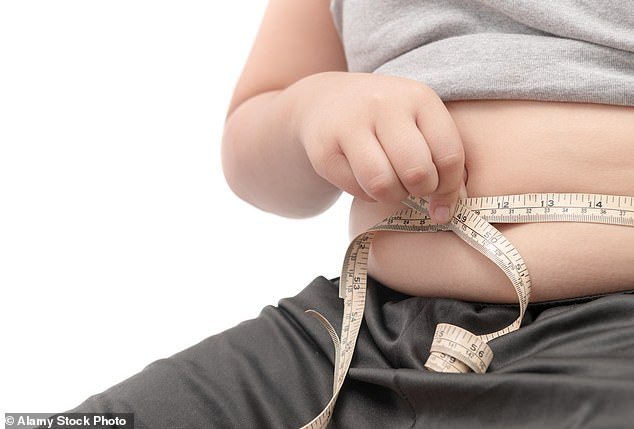Hundreds of fat children should be offered NHS weight-loss surgery to reverse their diabetes, according to a leading medic.
Growing numbers of youngsters in England — some as young as six — suffer type 2 diabetes. The condition occurs when the body loses its ability to process sugar and is often sparked by obesity.
It most commonly affects over-40s, who may have gained weight over decades, but the soaring obesity rate in under-18s has seen its level among young adults more than double in five years.
Now a surgeon has warned operations like up to £8,000 gastric bypasses and bands could be the only way to prevent diabetic children facing long-term damage.
Dr Andrew Beamish, an adolescent obesity expert at Swansea University, said children should ideally be offered surgery soon after being diagnosed.
‘We need to catch diabetes [in young people] early and we need to treat it with an operation,’ he told the virtual Diabetes UK Professional Conference.
‘This is a much more aggressive disease that progresses much more rapidly than in adults. We need to make sure we shut the gates before the horse bolts.’
Hundreds of fat children should be offered NHS-funded weight-loss surgery to reverse their diabetes, according to a leading medic. (Stock)

Andrew Beamish, an obesity expert, said fat children should be offered NHS surgery
There were 790 under-18s receiving treatment for type 2 diabetes from a paediatrician in England and Wales in 2018/19 — up from 340 in 2013/14, according to the latest figures from the Royal College of Paediatrics and Child Health (RCPCH).
Children as young as six have been diagnosed and the number of 13- and 14-year-olds with the condition jumped 39 per cent between 2017/18 and 2018/19.
Untreated or poorly managed diabetes can lead to serious health problems, including heart attacks, strokes, kidney failure, blindness and amputations.
Treating type 2 diabetes costs the NHS about £10billlion every year.
But Dr Beamish warned common treatments for type 2 diabetes, such as medications and insulin therapies, were not as effective at preventing damage from the condition in children as in adults.
Studies suggest these ‘first line’ treatments stopped working for one in five obese teenagers within a year, and for more than half within five years.
Weight-loss surgeries, such as gastric bands, can reverse diabetes for up to nine out of 10 patients who undergo it – but research suggests it worked best when they had only had the condition for a short period of time.
One Swedish study found 90 per cent of diabetic adults who had weight-loss surgery within a year of being diagnosed were free from the condition two years later, compared to just 40 per cent who had the surgery four or more years after being diagnosed.
Dr Beamish added there was plenty of evidence that surgery was ‘the most effective treatment’ for type 2 diabetes but that doctors had to ‘battle’ to get it for their patients.
Only a handful of under-18s have weight-loss surgery in England each year, with 18 cases in 2017 and 11 the previous year.
Half of under-18s with type 2 diabetes instead managed the condition with diet and medication to lower their blood sugar, RCPCH figures show.
Dr Lucy Chambers, of Diabetes UK, said: ‘Type 2 diabetes is a serious, long-term condition, which can be particularly aggressive in children and young people, who are more likely to develop complications and respond poorly to treatment.
‘Some studies have pointed towards bariatric surgery as a potential option for adolescents for whom other treatments have been unsuccessful.
‘But the clear link between rising obesity rates and increasing prevalence of type 2 diabetes in younger people highlights the crucial need for changes to our environment to help everyone live healthier lives.
‘The proposals in the Government’s recent Obesity Strategy would be a start, and we now need to see these put into action.’
Type 2 diabetes occurs when insulin, a hormone that is produced by the pancreas to turn the sugar in food into energy, either doesn’t work properly, or the pancreas doesn’t make enough of it.
This leads to abnormally high blood sugar levels which, if left untreated, can damage organs and tissues.
Eating sugary foods increases blood sugar levels, as can carbohydrates such as bread, pasta, potatoes and cereals, because once digested, they break down to form sugar.
However, weight loss, including with the help of a low-carb diet, can help to reverse type 2 diabetes.
